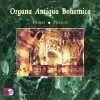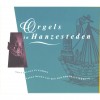Composers
Hendrik Franciscus Andriessen
| Country: | Netherlands |
| Period: | Neoclassicism |
Hendrik Franciscus Andriessen (September 17, 1892, Haarlem – April 12, 1981, Haarlem) was a Dutch composer and organist. He is remembered most of all for his improvisation at the organ and for the renewal of Catholic liturgical music in the Netherlands. Andriessen composed in a musical idiom that revealed strong French influences. He was the brother of pianist and composer Willem Andriessen and the father of the composers Jurriaan Andriessen and Louis Andriessen and of the flutist Heleen Andriessen.
Andriessen studied composition with Bernard Zweers and organ with Jean-Baptiste de Pauw at the Conservatory of Amsterdam. As the organist at Utrecht Cathedral, he became well known for his improvisation abilities. From 1926 to 1954, he lectured in composition and music theory at the Amsterdam Conservatory while also teaching at the Institute for Catholic Church Music in Utrecht between 1930 and 1949. He was the director of the Utrecht Conservatory from 1937 to 1949.
During World War II, Andriessen refused to join the "Cultural House" and was thus barred from public functions by the Nazi occupiers. The only musical activities he was allowed was to give lessons and to accompany church services. He was taken hostage by the occupation from July 13-December 18, 1942, but released.
In 1949, he was appointed director of the Royal Conservatory in The Hague, a post he held until 1957. Between 1954 and 1962, he was appointed an Extraordinary Professor of Musicology at the Catholic University of Nijmegen.
Andriessen's works included, besides eight masses, a setting of the Te Deum, four symphonies, variations for orchestra, lieder for voice and orchestra, chamber music, sonatas for cello and for piano, and works for solo organ.
Refine by search
view all| Country: | Netherlands |
| Period: | Neoclassicism |
Biography
Hendrik Franciscus Andriessen (September 17, 1892, Haarlem – April 12, 1981, Haarlem) was a Dutch composer and organist. He is remembered most of all for his improvisation at the organ and for the renewal of Catholic liturgical music in the Netherlands. Andriessen composed in a musical idiom that revealed strong French influences. He was the brother of pianist and composer Willem Andriessen and the father of the composers Jurriaan Andriessen and Louis Andriessen and of the flutist Heleen Andriessen.
Andriessen studied composition with Bernard Zweers and organ with Jean-Baptiste de Pauw at the Conservatory of Amsterdam. As the organist at Utrecht Cathedral, he became well known for his improvisation abilities. From 1926 to 1954, he lectured in composition and music theory at the Amsterdam Conservatory while also teaching at the Institute for Catholic Church Music in Utrecht between 1930 and 1949. He was the director of the Utrecht Conservatory from 1937 to 1949.
During World War II, Andriessen refused to join the "Cultural House" and was thus barred from public functions by the Nazi occupiers. The only musical activities he was allowed was to give lessons and to accompany church services. He was taken hostage by the occupation from July 13-December 18, 1942, but released.
In 1949, he was appointed director of the Royal Conservatory in The Hague, a post he held until 1957. Between 1954 and 1962, he was appointed an Extraordinary Professor of Musicology at the Catholic University of Nijmegen.
Andriessen's works included, besides eight masses, a setting of the Te Deum, four symphonies, variations for orchestra, lieder for voice and orchestra, chamber music, sonatas for cello and for piano, and works for solo organ.





![Het Historische Orgel in Nederland [CD 20 of 20]](http://static.classicalm.com/repository/collection-cover/small/1019-img1343989576349255.jpg)